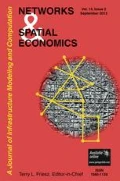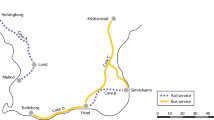Abstract
This paper analyzes the effectiveness of comprehensive policies—aimed at fostering a switch of truck traffic from the peak to the off-peak hours—targeting receivers and carriers of goods in urban areas. This paper is also based on the fundamental premise that truck traffic in congested urban areas could move to the off-peak hours, if and only if, the receivers of the cargoes are willing to accept off-peak deliveries. The paper provides a conceptual description, based on game theory, of the fundamental interactions between receivers and carriers and discusses empirical data that confirms the basic findings from the game theoretical analyses. The policy analyses are based on stated preference data that was analyzed using discrete choice models. The data considers different policy scenarios targeting both receivers and carriers. The receiver centered policies considered include tax deductions and shipping cost discounts to companies willing to accept off-peak deliveries; while the carrier centered policies include: a request from receivers to do off-peak deliveries; a request from receivers to do off-peak deliveries combined with toll savings for trucks traveling during the off-peak hours; and a request from receivers to do off-peak deliveries combined with financial rewards for trucks traveling during the off-peak hours. This is the first paper in a series providing insight into possible public policies aimed at encouraging receivers to accept off-peak deliveries. This paper focuses on providing the overall description of the research process, and on describing the results corresponding to receiver centered scenarios that encourage off-peak deliveries. In addition to analyzing the overall effectiveness of comprehensive receiver-carrier policies, the paper discusses the special cases of large traffic generators and neighborhoods with high truck traffic as potential targets of specific off-peak delivery initiatives.
Similar content being viewed by others
References
Ben-Akiva M, Lerman S (2000) Discrete choice analysis: theory and application to travel demand. MIT, Cambridge, Massachusetts
Campbell JF (1995) Peak period large truck restrictions and a shift to off-peak operations: impact on truck emission and performance. J Bus Logist 16(2):227–247
Cirillo C, Daly AJ, Lindveld K (2003) Eliminating bias due to the repeated measurements problem in SP data. Politecnico di Torino; Hague Consulting Group, The Netherlands
Dessau H (1892) Inscriptiones latinae selectae, no. 6085, starts at about line 56, Publisher Berolini, apud Weidmannos
Greenberg D (2003a) Wal-mart’s off-peak trucking plan scores points at port—up front. Los Angel Bus J
Greenberg D (2003b) Shift to off-hours loading could ease traffic near ports. Los Angel Bus J
Holguín-Veras J (2002) Revealed preference analysis of the commercial vehicle choice process. J Transp Eng 128(4):336–346 (American Society of Civil Engineers, July/August)
Holguín-Veras J (2006) The truth, the myths and the possible in freight road pricing in congested urban areas. National Urban Freight Conference, Long Beach California
Holguín-Veras J, Thorson E (2000) Origin-destination patterns of freight movements in the NYMTC region. New York Metropolitan Transportation Council
Holguín-Veras J, Polimeni J, Cruz B, Xu N, List G, Nordstrom J, Haddock J (2005a) Off-peak freight deliveries: challenges and stakeholders perceptions. Transp Res Rec 1906:42–48
Holguín-Veras J, Ozbay K, De Cerreño A (2005b) Evaluation study of port authority of New York and New Jersey’s time of day pricing initiative, March 2005. Accessible at: http://www.rpi.edu/~holguj2/PA/index.html
Holguín-Veras J, Pérez N, Cruz B, Polimeni J (2006a) On the effectiveness of financial incentives to off-peak deliveries to Manhattan restaurants. Transp Res Rec (in press)
Holguín-Veras J, Wang Q, Xu N, Ozbay K, Cetin M, Polimeni J (2006b) The impacts of time of day pricing on the behavior of freight carriers in a congested urban area: implications to road pricing. Transp Res, Part A Policy Pract 40:744–766
Nelson C, Siwek S, Guensler R, Michelson K (1992) Managing trucks for air quality. Transp Res Rec 1312:50–58
Rasmusen E (2001) Games and information: an introduction to game theory. Blackwell, Massachusetts
Sullivan E (2000) Continuation study to evaluate the impacts of the SR 91 value-priced express lanes. Submitted to State of California, Department of Transportation, Traffic Operations Program (Final Report, Accessed on 05/01/06 at http://ceenve.calpoly.edu/sullivan/sr91/sr91.htm)
Author information
Authors and Affiliations
Corresponding author
Rights and permissions
About this article
Cite this article
Holguín-Veras, J., Silas, M., Polimeni, J. et al. An Investigation on the Effectiveness of Joint Receiver–Carrier Policies to Increase Truck Traffic in the Off-peak Hours. Netw Spat Econ 7, 277–295 (2007). https://doi.org/10.1007/s11067-006-9002-7
Published:
Issue Date:
DOI: https://doi.org/10.1007/s11067-006-9002-7




